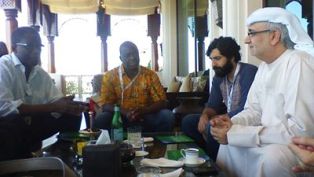By Ogova Ondego
Published May 16, 2011
Fatmira, a seven-year-old orphan, lives in UN-administered post-war Kosova and works hard eking a living from selling chewing gum in the hope of making some money that she could use in travelling to a far-off mountain in order of re-uniting with her late mother she believes now lives as a mountain fairy. But this changes the moment she encounters Mrs UN, a United Nations judge responsible in the rebuilding of Kosova’s judicial system despite her own family crisis. This is the setting of REFREN PER KOSOVEN (Requiem for Kosova), a 20-minute film made in 2010 by Dhimiter Ismailaj, a Kosovar American.
No one can see this film ‘that has been selected for official competition at the Nairobi-based 6th Lola Kenya Screen audiovisual media festival, skill-development mentorship programme and market for children and youth in eastern Africa (August 8-13, 2011)’ and remain unaffected, even if one’s heart is made of cast iron or steel. Besides the moral dilemmas’ Mrs UN’s ‘high life’ daughter is dying back home in the first world of Europe and requires an urgent organ transplant that could be provided by the poor, desperate and almost hopeless ‘low life’ Fatmira,presented in REFREN PER KOSOVEN, this film also appears to question the commitment of the United Nations to the wellbeing of Kosova as portrayed on television: “We are here, because we believe that the Kosovars deserve freedom. Because they want to be part of a whole free world and its values. And, we will help them go through the path of these values. And, we will be here as long as needed.”
If that were true, why are the UN premises fortified with with concrete and metal grills with its staff living large, driving gas guzzling 4-wheel drive vehicles and earning king-size salaries in an impoverished country in which everyone from toddlers to elderly great grandparents having to eke a living from odd jobs? Why is it that the UN has failed to recognise and accept Kosova, that declared her own independence from Serbia on February 17, 2008–as a sovereign state and therefor a member country among 192 other countries? Why is it that only 75 0f the 192 members led by the USA, Britain and France are the only ones that recognise Kosova?
RELATED: An All-Africa Network of Festivals to be launched in Accra, Ghana
Though Kosova gained independence a decade after the war and “the dream came true for more than two million Kosovars, and another six million Albanians in mainland Albania, Macedonia, Montenegro and other parts of the world,” writer/director/co-producer Ismailaj says in his ‘Director’s Statement’, “this fact cannot and will not erase the frustration, anger and poverty the Kosovars went through and endured during the UN’s administration of the country. It remains to be seen whether this was intentional or not, but the fact remains that UN could not or did not want to make up its mind and bless Kosova’s independence even a decade after the war.”
Saying mysterious forces working behind the scenes to hinder Kosova’s independence forced the Albanians to declare it unilaterally in 2008, Ismailaj laments that “The status quo impoverished the country even further, forcing the Albanian population of every age to seek odd jobs, and make a living in any way they could. Malnourished children as young as 5 years old would cruise the city’s cafeterias selling gum and cigarettes, mostly to the UN employees. Throughout this period of time, the UN officials and the rest of foreign organisations were earning ‘fat’ salaries running a country they were supposed to help rebuild.”
 The film, a fictional drama, decries the illegal trafficking of human organs that happens in countries involved in violent conflicts. “Although we believe in the individual’s rights of having an organ transplant, we cannot and shouldn’t turn a blind eye at the means and methods used in many cases to get these organ transplants from the donor to the patients of transplant, from different parts of the world,a promotional poster for the film says. Does the UN know what some of its employees do in the countries under the world body’s mandate? Does it, for instance, know that some of the doctors and judges working for it could be involved in more than legitimate business?
The film, a fictional drama, decries the illegal trafficking of human organs that happens in countries involved in violent conflicts. “Although we believe in the individual’s rights of having an organ transplant, we cannot and shouldn’t turn a blind eye at the means and methods used in many cases to get these organ transplants from the donor to the patients of transplant, from different parts of the world,a promotional poster for the film says. Does the UN know what some of its employees do in the countries under the world body’s mandate? Does it, for instance, know that some of the doctors and judges working for it could be involved in more than legitimate business?
RELATED: 10th Images de France Film Festival Brings Free Drama, Comedy and Animation to Nairobi
“With all these facts, one cannot help but ask serious questions regarding the morals and ethics of an organisation that was created to help protect the poor and the weak,” says Ismailaj.
According to Ismailaj who migrated to the USA in 1999, REFREN PER KOSOVEN “was born out of our lengthy observation of the UN management and the situation it created in Kosova.”




